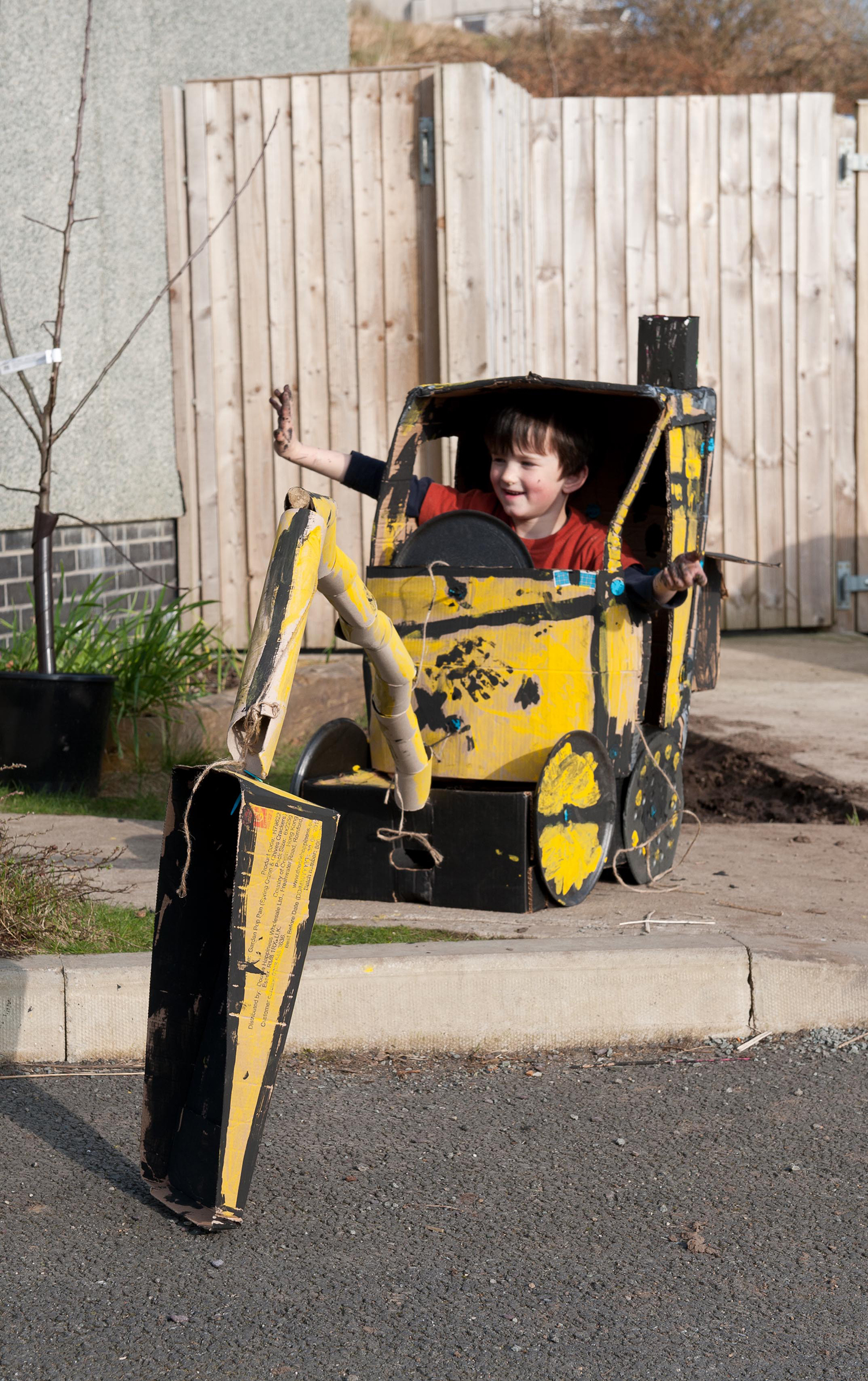This Melbourne company's secret to success? Cardboard boxes

MELBOURNE -- In front of the Heide Museum of Modern Art, a six-year-old girl is cutting out circular shapes to form the wheels of a racing car. Nearby in a Spiderman costume, her eight-year-old brother is running around in a decorated box-cart. The siblings, along with a dozen kids and their families, are participating in a car-making activity for Father's Day in Melbourne, sponsored by Makedo, a toy company encouraging kids to use discarded materials to make cars, robots, wind balls, life-size mazes and just about anything else imaginable.
Makedo's range of ingenious play tools help turn an idea into reality by aiding the construction process. "We like to think of it as Mr. Potato Head for the box -- find a box, connect the parts, play and imagine," says Makedo's founder Paul Justin, describing his latest designs, "Scru," the world's first child-friendly screw and "Props," a range of pre-illustrated cut out plastic box accessories.
Other product examples include the "Safesaw," which allows kids to saw and punch cardboard without the dangers of sharp tools, and the patented "Reclip," a fastener which can connect layers of material (card, plastic, fabric) together, a far more intuitive and effective alternative to sticky tape and glue.
Justin explains that Makedo (pronounced "make do") is about taking an unstructured approach to play and creativity. "The idea of using imagination as a key ingredient to play is by no means new," says the father of four. "Parents often tell of how their kids play with the box more than the toy. We love this style of play and try to support it with customized tools to make it safe and easy for kids to engage in."
Since launching in 2009, the company has grown its presence in over 40 countries. Makedo's products have won them numerous design, parenting and eco awards and are stocked in the world's leading toy specialty and design retailers. The company is active in the creative community, sponsoring a range of events including the upcoming Global Cardboard Challenge and the Archikidz! event in Sydney.
According to the Australian Toy Association, the toy industry contributes approximately AUD$2 (USD$1.8) billion at a retail level to the nation's economy.
The Melbourne designer says that his company's activities and products are aligned with the 'creativity in education' movement advocating more creative instruction of traditional academic subjects in public schools.
"Our mission is to offer another way to play which still has a grassroots feel, where those who 'get it' are passionate advocates in their pocket of the globe," Justin says.
The idea for Makedo was inspired by Justin's own experience as a father. At the age of five, his son Ezra would continually approach him with a new idea for something to make. One week it was a robot costume, the next a playhouse and then a spaceship. At the same time the designer, influenced by the teachings of Ken Robinson, Noam Chomsky and Lev Vigotsky who highlight the importance of creativity in learning, was thinking about his kids' education.
"I wanted a system that taught kids not what to think but how to think, a type of open-ended creativity missing from so many kids' products today," he says.
Since July 2012, Makedo has sold over 1,200 of its Classroom Kit product, a box comprised of reusable parts and connectors designed for use in group-making activities.
Dr Gary S. Stager, an educator who uses Makedo products in his workshops argues the Australian Government education department has become more punitive and fixated on deeply flawed data schemes that view children and teachers as the enemy, not beneficiaries of education.
Professor Yong Zhao, an associate dean for Global Education at the University of Oregon, told the Australian Broadcasting Corporation last month that standardized testing, which is currently practiced in Australia, is being counterproductive to the development of creativity in education.
Stager contends that, from an early age, there is an alarming global trend toward whole class instruction, where children are required to endure tedious lecture-style learning or to fill every second of the school day with arranged activities.
The education expert, who has spent the past 31 years helping schools around the world embrace creativity, believes that Makedo makes a great contribution to the world of learning by championing the importance of doing and firsthand experience.
"It is amazing what may be learned and to see creativity unleashed when a child (or their teacher) is able to invent something substantive with cardboard, their hands, heads and hearts," he says.
Justin believes that we are operating in an education system that was "designed to feed a factory workshop." Yet children today will likely have multiple careers, in jobs that do not even exist yet. "I believe creativity is the currency of tomorrow and I wanted to nurture this creative thinking in my own kids," he says.
Photos: Makedo.
This post was originally published on Smartplanet.com

